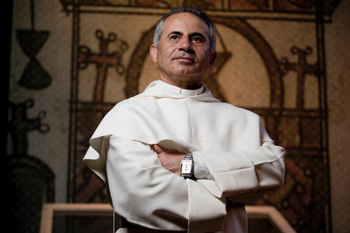By Mark Ellis

With ISIS fighters visible in the distance and bullets whistling over his head, Friar Najeeb Michaeel sprang into action to save hundreds of ancient Christian manuscripts in his possession.
“You are going to get us killed with your archives,” his assistant complained as they struggled to haul six boxes of the documents out of Qaraqosh, according to a report by Agence France-Presse (AFP).
Previously, Michaeel was forced to take his priceless collection from Mosul to Qaraqosh during an Islamist insurgency in 2008, when thousands of Christians fled the city, according to AFP.
Last year, the friar watched as ISIS fighters seized town after town, destroying priceless artifacts and documents in museums and libraries in their charge across Iraq and Syria.
As ISIS seized the ancient city of Palmyra in Syria on May 21st, Friar Michaeel told AFP in Paris how he was gripped with the desire to preserve the remnants of Iraq’s 2,000-year-old Christian heritage.
“It was imperative that these manuscripts, conserved in the Dominican library in Mosul and then in Qaraqosh, escape the systematic destruction of the non-Muslim cultural heritage,” he told AFP.
“I thought we were going to die.”
When ISIS seized Mosul in June, a short distance from Qaraqosh, Michaeel took action. “We loaded a large part of the manuscripts in a truck and drove them to Erbil, which is 70 kilometers (40 miles) away,” he told AFP.
When the jihadists descended on Qaraqosh on August 7, causing the remaining Dominican friars to escape, he hid the valuable manuscripts in his car.
“We were engulfed in the massive exodus of Christians and Yazidis who were fleeing to Erbil”, Michaeel told AFP.
“We could see the black flag of Daesh (ISIS) from a distance. We were protected by armed peshmerga (Kurdish fighters) but they wouldn’t let our car cross the border.
“So I started to take the boxes of manuscripts out of the car and hand them to passers by,” he said.
“Bullets were whistling above our heads and I thought we were going to die,” he told AFP. “Children were crying, women too. I was carrying six boxes; it was heavy; I couldn’t run.”
Luckily, a car was waiting for them in the Kurdish region, and all the boxes arrived safely and are now hidden in Erbil.
The Friar’s archive includes historical and philosophical texts, music and literature written in Aramaic, Syriac, Arabic and Armenian.
They bear witness to the long Christian tradition in Mesopotamia — considered the cradle of Western civilization — which survived as most of the region converted to Islam in the 7th century.
Michaeel’s collection is “a bridge between civilizations; they bear witness to the past and say a lot about the present,” the friar told AFP, adding he sees them as his “children.”
The friar and his staff have been working to digitize the ancient collection, photographing them and storing them on a hard drive.
“Since 1990 we have digitized 8,000 manuscripts from the region. Half of the originals no longer exist as they have been destroyed by the Islamic State,” he said.
Copies of seven of these documents are currently being displayed at the National Archives in Paris at an exhibition entitled: “Mesopotamia, a crossroads of cultures.”



